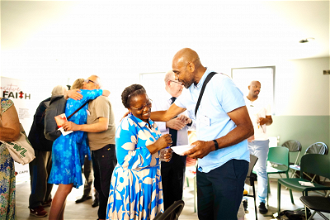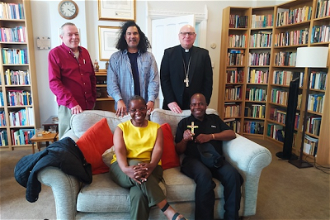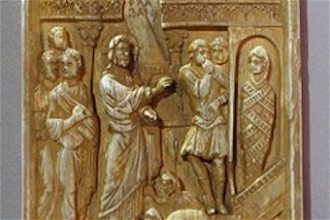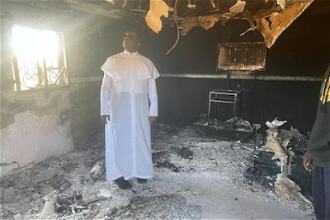Sunday Reflection with Father Terry Tastard - 27 September 2010
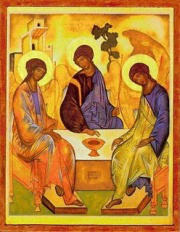
Rublev's Three Visitors
The parable that we hear in the gospel today is sometimes called the story of Dives and Lazarus, although Dives is simply the Latin for 'a rich man'.
It is about an indifferent rich man and the suffering person at his gate. In the medieval period when they heard about sores they thought of lepers, and Lazarus was associated with leprosy. In Italian, for example, a leper colony was called a lazaretto. To understand Jesus, we have to have some sense of his audience. Our gospel opens with Jesus talking to the Pharisees, but beyond them there was wider circle listening, eavesdropping at it were, and it helps to picture them. There were the sick and the mentally ill; there were the landless poor; there were the traders and tax collectors; there were Pharisees, the religious elite who were rattled by Jesus. All those listening to Jesus were Jews. Now, bearing all this in mind, remember that when Lazarus dies and goes to heaven he is embraced by Abraham. What do we know about Abraham?
First of all, he was the founding father of the Jewish people. He was the patriarch they traced their origin back to. So Jesus, in describing this poor man as being in the bosom of Abraham, is saying that despite his poverty, he belonged to the Jewish people. One of the ways poverty impacts people is it causes a loss of self-confidence in the poor. They feel at the margins of society. The rich are the important people, the ones with the connections. Jesus in this parable says No: we all belong to the people of God, and our wealth, or our poverty do not count. As Christians we know that what matters is faith and baptism. This joins us to Christ, and makes us part of the people of God.
The second thing we know about Abraham is that a simple act of hospitality was a turning-point in his life. He and his wife Sarah had no heirs, no children of their own. One day, in the hottest part of the afternoon when everybody was resting in the shade, three strangers arrived outside Abraham and Sarah's tent. Abraham and Sarah would have been quite right to have sent them away. Instead Abraham rushed to feed them, and made them welcome.
These mysterious visitors then made a prophecy: by the will of God, he and Sarah would have a child, and numerous descendants. All this flowed from Abraham's generous hospitality. How different from the indifference of the rich man towards the poor at his gate.
Those listening to Jesus would have made the connection. Imagine the audience listening to Jesus as he told the story. For the poor, the message would have been clear. You too belong. Even although you may feel ashamed of your poverty, there is no need to feel ashamed, for we are all part of the People of God. For the well-off, the challenge was to find ways of making the world a welcoming place, helping those who needed help.
We need a brief word about the reading from Amos. Around the year 760 BC the Assyrian Empire was growing stronger and stronger. The prophet Amos looked at Samaria and saw the enormous gulf between rich and poor. How can this nation survive, how can be it strong, he asked, if the rich endlessly pursue pleasure and ignore or even exploit their poor countrymen? Such a nation will have no backbone, no sense of identity and loyalty. And he was right.
Fr Terry is Parish Priest at Holy Trinity Catholic Church in Brook Green, west London. His latest book: Ronald Knox and English Catholicism is published by Gracewing at £12.99 and is available on Amazon, on ICN's front page. To read Sr Gemma Simmonds' review on ICN see: www.indcatholicnews.com/news.php?viewStory=16114



